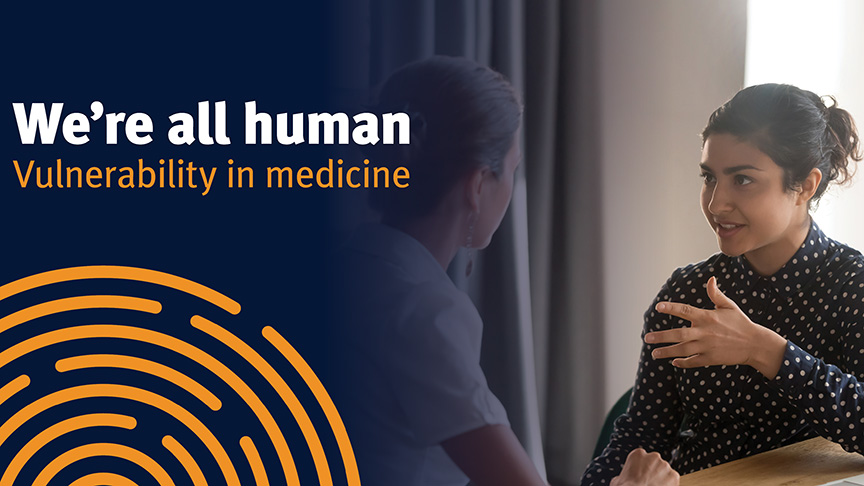
Our team is developing a curriculum on embracing vulnerability in medicine and embedding it across our program as a core value. We thank our Trainee Advisory Group (TAG) who gave us great insight to the value they place on personal, real stories shared by medical professionals and asked us for skills to support colleagues in need, instead of another ‘self-care’ or wellness ‘how to’ as part of their training.
Our work in this space is on the back of a growing recognition of the importance of embracing our humanness, self-compassion and a growth mindset – all to maintain our wellness as clinicians and find meaning in medicine. This is in the wake of groundbreaking pilot programs for medical students in this space.
What do we mean by vulnerability? For our purposes, the concept and experience of vulnerability broadly covers situations of uncertainty, risk and emotional exposure – all things we might try to avoid professionally, but those that (if we are honest with ourselves) are an everyday part of being a clinician, especially a Rural Generalist.
Recognising, acknowledging, and exploring our vulnerabilities with ourselves and our colleagues is a highly valuable reflection point. It is a skill to foster as we work towards a future of rural and/or remote medicine that is good for our patients, our communities, and the clinicians who serve them.
We invited our team members to start the conversation by sharing their own stories of professional and personal vulnerability below. The more sensitive team member experiences and stories have been incorporated into specific workshop session as a catalyst for discussion, sharing, and connection for trainees and alumni alike.
Vulnerability and vulnerability in medicine is a big topic. If you are keen to learn more about embracing it in your personal and professional life, check out the resources listed below.
We will leave you with some curious questions and reflection points to ponder, journal, or discuss with a trusted colleague (you can even claim the time spent as CPD):
- What situations in your professional life have made you feel vulnerable (uncertain, at risk, emotionally exposed, uncomfortable)? What happened?
- What about the situation made it feel uncomfortable?
- What was significant about this situation? Why was it important? What did it mean to you?
- How did you manage the experience, if you were to be in the situation again what would you do differently? The same?
- What did you learn from this experience? What did you take away from the experience? Initially? Has that changed now that you have reflected more deeply?
- Did anything change in your practice? Is there anything you want to know more about?
If you would like to know more or would like some help to navigate vulnerabilities you may be experiencing, please contact our team.
“Vulnerability sounds like truth and feels like courage. Truth and courage are not always comfortable, but they are never weakness…”
References
Kelly, M., Lynch, J., Mainstone, P., et al. (2022). ‘Things we are expected to just do and deal with’: Using the medical humanities to encourage reflection on vulnerability and nurture clinical skills, collegiality, compassion, and self-care. Perspect Med Educ 11, 300–304. https://doi.org/10.1007/s40037-022-00724-w
Konkin, J., Grave, L., Cockburn, E., et al. (2020). Exploration of rural physicians’ lived experience of practising outside their usual scope of practice to provide access to essential medical care (clinical courage): an international phenomenological study BMJ Open. 10: https://doi.org/10.1136/bmjopen-2020-037705
Shanafelt, T., (2021). Physician Well-being 2.0: Where Are We and Where Are We Going?. Mayo Clinic proceedings, 96(10), 2682–2693. https://doi.org/10.1016/j.mayocp.2021.06.005
Brown, B., (2012). Daring Greatly: How the Courage to Be Vulnerable Transforms the Way We Live, Love, Parent, and Lead. New York, NY, Gotham Books.
Lynch, J., (2020). A whole person approach to wellbeing: building sense of safety. Routledge.
Richardson, D., Kinnear, B., Hauer, K., et al. (2021). Growth mindset in competency-based medical education, Medical Teacher, 43:7, 751-757. https://doi.org/10.1080/0142159X.2021.1928036